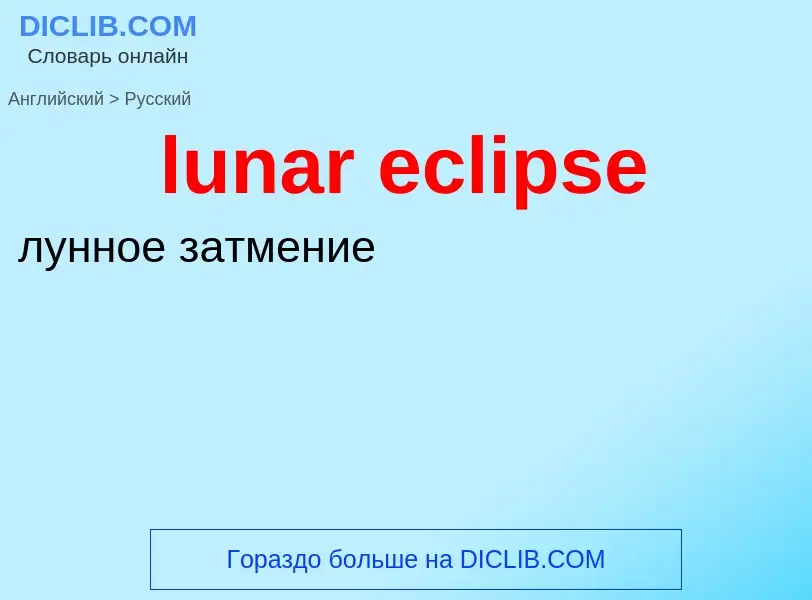Traduction et analyse de mots par intelligence artificielle ChatGPT
Sur cette page, vous pouvez obtenir une analyse détaillée d'un mot ou d'une phrase, réalisée à l'aide de la meilleure technologie d'intelligence artificielle à ce jour:
- comment le mot est utilisé
- fréquence d'utilisation
- il est utilisé plus souvent dans le discours oral ou écrit
- options de traduction de mots
- exemples d'utilisation (plusieurs phrases avec traduction)
- étymologie
lunar eclipse - traduction vers russe
общая лексика
лунное затмение
Définition
Wikipédia

A lunar eclipse is an astronomical event that occurs when the Moon moves into the Earth's shadow, causing the moon to be darkened. Such alignment occurs during an eclipse season, approximately every six months, during the full moon phase, when the Moon's orbital plane is closest to the plane of the Earth's orbit.
This can occur only when the Sun, Earth, and Moon are exactly or very closely aligned (in syzygy) with Earth between the other two, which can happen only on the night of a full moon when the Moon is near either lunar node. The type and length of a lunar eclipse depend on the Moon's proximity to the lunar node.
When the moon is totally eclipsed by the Earth, it takes on a reddish color that is caused by the planet when it completely blocks direct sunlight from reaching the Moon surface, as only the light reflected from the lunar surface has been refracted by Earth's atmosphere. This light appears reddish due to the Rayleigh scattering of blue light, the same reason sunrise and sunsets are more orange than during the day.
Unlike a solar eclipse, which can only be viewed from a relatively small area of the world, a lunar eclipse may be viewed from anywhere on the night side of Earth. A total lunar eclipse can last up to nearly 2 hours, while a total solar eclipse lasts only up to a few minutes at any given place, because the Moon's shadow is smaller. Also unlike solar eclipses, lunar eclipses are safe to view without any eye protection or special precautions.
The symbol for a lunar eclipse (or indeed any body in the shadow of another) is (U+1F776 🝶).



![refracts]] [[sunlight]] into the shadow cone. refracts]] [[sunlight]] into the shadow cone.](https://commons.wikimedia.org/wiki/Special:FilePath/Blood Moon Corrected Labels.png?width=200)
![a lunar eclipse]]. a lunar eclipse]].](https://commons.wikimedia.org/wiki/Special:FilePath/Eclipse Christophe Colomb.jpg?width=200)
![refracted]] by Earth's atmosphere, producing a reddish color. refracted]] by Earth's atmosphere, producing a reddish color.](https://commons.wikimedia.org/wiki/Special:FilePath/Full Eclipse of the Moon as seen in from Irvine, CA, USA (52075715442) (cropped).jpg?width=200)
![refracted]] by Earth's atmosphere shines on the Moon, leaving a reddish color. This can be seen in different exposures of a partial lunar eclipse, for example here with exposures of 1/80, 2/5, and 2 seconds. refracted]] by Earth's atmosphere shines on the Moon, leaving a reddish color. This can be seen in different exposures of a partial lunar eclipse, for example here with exposures of 1/80, 2/5, and 2 seconds.](https://commons.wikimedia.org/wiki/Special:FilePath/Lunar eclipse oct 8 2014 Minneapolis 4 46am.png?width=200)
